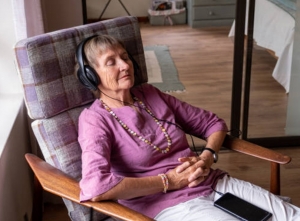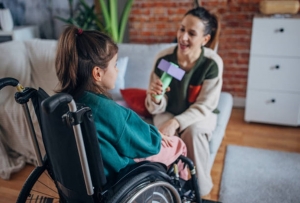Researchers at the University of Roehampton have developed "Take Note," a new musical resource to support people with dementia. Take Note includes a website and a set of 100 activity cards designed to help carers engage older adults with music-based activities. Created by Dr Fi Costa and Professor Adam Ockelford, these resources are grounded in over 50 studies exploring the connection between music and dementia, highlighting music’s ability to spark memories, revive skills, and encourage social interaction.
The resources aim to make music an accessible tool for carers, requiring minimal preparation and allowing meaningful interaction without extensive training. Music has been shown to reduce distress, support emotional expression, and enhance social bonds for those with dementia. By providing practical ideas, Take Note seeks to empower carers to incorporate music effectively in daily routines and group settings.
Since 2022, the Cinnamon Care Collection has piloted the Take Note resources in five of its care homes across London, Hampshire, and East Sussex, including Eden Court and Rectory Court, where positive outcomes have been observed. The Take Note website includes over 50 instructional videos demonstrating how each activity can be used to foster engagement and well-being.
Professor Ockelford shared that, after years of work in care homes, the project team identified a clear need for resources that guide carers on how to deliver impactful music interventions. Take Note was officially launched on 22 October 2024, at the University of Roehampton's "Take Note Conference," marking a milestone in dementia care research.
Four major autism charities are urging the government to address a critical crisis affecting thousands of people awaiting autism diagnoses and facing inadequate care. This call follows a recent report by the Care Quality Commission (CQC), highlighting significant failures in health and social care for people with learning disabilities and autism. The charities have written to government officials, asking for increased funding to stabilise and strengthen the struggling care system.
The CQC report revealed worrying health inequalities, including lower life expectancy and preventable deaths among people with learning disabilities and autism. Many face delayed diagnoses and missed opportunities for early intervention, with waits extending far beyond recommended times. Additionally, only a small proportion of people with learning disabilities are recorded on relevant health registers, meaning many miss out on necessary proactive care.
Another pressing concern is the use of restrictive practices, with reports of excessive restraint and other restrictive measures due to limited staff training and awareness. Some care providers lack the appropriate skills to support people who may be distressed, leading to harmful and sometimes illegal practices. Closed cultures in care settings also contribute to unchallenged, restrictive methods, with staff often unaware of the consequences of their actions.
Finally, there’s a call for better staff training and adherence to the forthcoming Oliver McGowan Code of Practice, which outlines mandatory requirements for supporting individuals with learning disabilities and autism. Ensuring that staff are adequately trained is essential to improving the quality of life and outcomes for those in care.
The Public Services Committee has called on the government to implement several recommendations to improve support for young disabled people entering employment. Their report, Think Work First: The transition from education to work for young disabled people, outlines 36 recommendations, including increasing transparency on Access to Work wait times, providing better training for Disability Employment Advisors (DEAs), and expanding supported internships.
The report highlights the 30% disability employment gap, with young disabled people facing significant barriers from education through to employment. The inquiry found that low expectations and a lack of tailored support in schools and employment services contribute to these challenges. Good examples of careers education and workplace support exist, but they are not widespread enough and are often at risk of being discontinued.
The Committee emphasises the need for employers to feel confident hiring disabled workers and to ensure inclusive recruitment practices. They also stress the importance of changing attitudes, urging that aspiration and the belief that disabled people can thrive in work should be central to support.
Jon Sparkes, Chief Executive of Mencap, added that people with learning disabilities need more targeted support, such as accessible internships and employer training. He called on the government to invest in employment programmes that match the ambitions of disabled people, ensuring they receive the support needed to succeed in the workplace.
TV BRA, a Norwegian TV station where all reporters are disabled or autistic, is making waves with its unique approach to news broadcasting. Every week, the team produces a one-hour programme covering news, entertainment, and sport, which is aired on TV2 Play and their own platform. With around 5,000 weekly viewers, the show is presented in simple Norwegian and at a slower pace, making it more accessible to those with learning disabilities.
The station’s 10 reporters, including Emily Ann Riedel, who has Down's syndrome, work across Norway as local correspondents. They tackle a range of important issues, from community news to interviews with politicians. Riedel speaks of the professionalism required at the station, saying she has learned to balance her lively personality with the demands of delivering the news.
TV BRA also highlights stories of rights for disabled people, such as a recent report on a woman whose shopping assistance was threatened by local authorities. Although funding is tight, the team is motivated by a passion for improving understanding and representation of disabled people.
The station’s managing editor, Camilla Kvalheim, is proud of their progress, insisting that the team meet professional standards. TV BRA's work empowers both their reporters and viewers, making the news more accessible for people with learning disabilities across the country.
The Law Commission has launched a consultation aimed at reforming disabled children’s social care law to make it fairer, simpler, and more accessible for families. The current legal framework, which determines what support disabled children can receive from social services, is outdated and inconsistent, with some legislation dating back over 50 years. This has led to variations in support offered by local authorities and created unnecessary barriers for parents and carers seeking help for their children.
The consultation follows recommendations from the 2022 Independent Review of Children’s Social Care, which highlighted the difficulties families face in understanding and accessing support. The Law Commission is now seeking input from young people, families, social workers, local authorities, and anyone with knowledge of the area to guide its reform recommendations.
Professor Alison Young, Commissioner for Public Law, stressed the importance of modernising the law to reflect changing needs and improve clarity for families and service providers. The consultation will cover areas such as assessments, eligibility, service provision, transitioning to adult care, and the definition of disability.
Minister for Children and Families, Janet Daby, emphasised the need to remove outdated language and streamline the legal system, allowing social workers to focus more on improving the lives of vulnerable children and families, and ensuring disabled children receive the support they need.
A recent large-scale study has found that siblings of autistic children are seven times more likely to be diagnosed with autism themselves, a rate 20% higher than infants without autistic siblings. The US-led research, published by American Academy of Pediatrics (AAP), followed 1,605 infants with older autistic siblings across the US, Canada, and the UK, tracking their development from infancy to the age of three.
The study revealed that the likelihood of autism increases if a child has more than one autistic sibling, with a 37% chance of being diagnosed compared to 21% for those with just one autistic sibling. Boys were found to be almost twice as likely as girls to develop autism. Researchers also noted a higher recurrence rate in non-white families.
The findings mirrored previous studies and emphasised the need for close monitoring of siblings of autistic children, particularly in families with less access to care. Early intervention and diagnosis remain crucial, especially in families facing socio-economic challenges.
The study also highlighted educational disparities, with the recurrence rate decreasing as the mother’s education level increased. Researchers stressed the importance of further research into social determinants of health that may contribute to these trends but acknowledged that more work is needed to answer these complex questions.
Free NHS eyesight, hearing, and dental checks will soon be available to over 18,000 young people with special educational needs and disabilities (SEND) attending residential special schools and colleges across England. This initiative aims to ensure that any health issues are identified promptly, allowing children and young people to receive appropriate care and follow-up support quickly.
Research indicates that autistic children and those with learning disabilities are at a higher risk of developing eyesight, hearing, and dental problems compared to their peers. Additionally, they may struggle to communicate their difficulties, making early detection even more crucial. After successful pilot programmes in residential special schools during 2022 and 2023, the NHS will expand these sensory checks to all special residential schools and colleges next year.
The new programme will include a minimum of one annual face-to-face dental check, along with regular oral health advice to address concerns such as applying fluoride varnish and promoting effective toothbrushing. Hearing assessments will be conducted when children enter school and during key transitions, with referrals made to GPs or local audiology teams if any issues arise.
Tom Cahill, National Learning Disability and Autism Director at NHS England, emphasised the importance of these specialised checks in meeting the needs of vulnerable children in residential settings. He stated that tailored services delivered by trained staff will ensure these young individuals receive the same level of sensory checks that their peers do, ultimately addressing health inequalities and enhancing overall well-being.
Individuals who have faced challenges in securing employment due to mental health issues will soon receive valuable support aimed at facilitating their return to work. Workbridge, an initiative under the mental health charity St Andrew's Healthcare, has been granted £60,000 by West Northamptonshire Council, which is controlled by the Conservative party. This funding comes from the UK Shared Prosperity Fund and is part of a broader initiative designed to enhance local skills in Northampton.
The programme will focus on providing wellbeing support alongside essential skills training. Dr Inga Stewart, a consultant psychologist at St Andrew's, emphasised the collective responsibility to create supportive work environments that safeguard mental health. Statistics from Mental Health UK indicate that over 20% of employees took leave last year due to stress, highlighting the urgent need for effective workplace mental health strategies.
The five-week programme will empower participants to develop new skills, cultivate resilience, and boost their confidence, ultimately aiding their journey towards employment. Jenny Lane, Workbridge's education manager, expressed pride in assisting individuals living with mental illness, autism, learning disabilities, or brain injuries in acquiring vital vocational and life skills.
Referrals to the Workbridge vocational programme will be facilitated through the Department for Work and Pensions and Northampton's Wellbeing Launchpad, although self-referrals will also be accepted for those who meet the necessary criteria. This initiative represents a significant step forward in supporting mental health recovery and enhancing employability within the community.















